|
|
|
Sort Order |
|
|
|
Items / Page
|
|
|
|
|
|
|
| Srl | Item |
| 1 |
ID:
133698
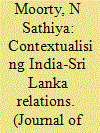

|
|
|
|
|
| Publication |
2014.
|
| Summary/Abstract |
Unlike what may have been reduced to in some circles, India- Sri Lanka relations are not a 'one-issue affair', centred on the vexatious ethnic problem in the island-nation, or on its influence and impact on
the south Indian State of Tamil Nadu. Instead, they continue to be multi-dimensional and multifarious, standing as testimony and test- case to the path of greater regional stability and cooperation, which
is in the interest of South Asia as a whole.
|
|
|
|
|
|
|
|
|
|
|
|
|
|
|
|
| 2 |
ID:
133700


|
|
|
|
|
| Publication |
2014.
|
| Summary/Abstract |
Sandy beaches along the 220km long West Bengal coast on the Northwest coast of the Bay of Bengal have not received much attention in the recent past despite their continual degradation both from natural forces and man-made activities related to construction of hotels, destruction of sand dunes and dune vegetation, beach- sand mining, discharge of hotel wastes directly onto the beach, and unscientific beach protection measures (Bhattacharya et al., 2003, Bhattacharya etal. 2009). Unethical and rampant use of this coastal zone by hoteliers, often violating the Coastal Zone Regulations (CRZ), has been vandalizing certain beach stretches for over two decades now. (wvvw. Dishaearth.org./mandarmoni). Burgeoning population growth in the state is causing increasing use of beaches for pleasure, recreation, and leisure activities throughout the year. Together with this, as pointed out by Klein (1985), beaches support coastal economics, commercial development, tourism and shift of population to the coastal areas.
|
|
|
|
|
|
|
|
|
|
|
|
|
|
|
|
| 3 |
ID:
133694
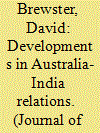

|
|
|
|
|
| Publication |
2014.
|
| Summary/Abstract |
India and Australia have the potential to become important strategic partners in Asia as part of a coalition that could help manage the changing balance of power in the region. But while India and Australia share many strategic interests, both countries still have a lot to learn about how to get along with each other. Some might even see them as the odd couple of the lndo-Paci?c. This paper looks at recent developments in the relationship in the areas of security, politics and economics, and the prospects for a closer partnership under the new Modi government.
|
|
|
|
|
|
|
|
|
|
|
|
|
|
|
|
| 4 |
ID:
133697
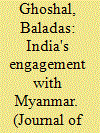

|
|
|
|
|
| Publication |
2014.
|
| Summary/Abstract |
Aimed at improving relations with Myanmar's ruling junta, as it was also becoming clear that the pro-democracy movement would not achieve power within the foreseeable future. SLORC regime. Within the government, there were already strong protests from many of the military, intelligence, and foreign ministry officials against the policy of supporting the democracy movement and side-lining the junta regime at the cost of national interest.
|
|
|
|
|
|
|
|
|
|
|
|
|
|
|
|
| 5 |
ID:
133693
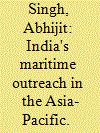

|
|
|
|
|
| Publication |
2014.
|
| Summary/Abstract |
In the past few years, New Delhi's drive to improve maritime relations with East and South East Asia has acquired a frisson of urgency. India's "Look-East" Policy, a largely trade and commerce oriented framework guiding interactions with nations to lndia's East, has now acquired a prominent nautical edge. With increased maritime forays and a clear articulation by the political leadership, ofthe principle of "freedom of navigation" and an "open and inclusive" architecture of global maritime security, New Delhi has shown it is inclined to treat the Western Pacific as a theatre of commercial and maritime security interests.
|
|
|
|
|
|
|
|
|
|
|
|
|
|
|
|
| 6 |
ID:
133696


|
|
|
|
|
| Publication |
2014.
|
| Summary/Abstract |
The dynamics of the Indian Ocean region have great economic and political implications - particularly for South Asia. It has always been an arena of power struggle. it has become much more vibrant in the post Cold War scenario, particularly after the collapse of the Soviet Union as a dominant player in world politics. As far as India is concerned, it is considered to be the largest and the most geostrategically located country in the Indian Ocean, with a substantially long coast line. Therefore, any disturbance to the stability of the Indian Ocean region has a direct impact on India's security. Indian Ocean being the only ocean named after a particular country has been viewed as India's backyard by Indian strategic thinkers.
|
|
|
|
|
|
|
|
|
|
|
|
|
|
|
|
| 7 |
ID:
133695
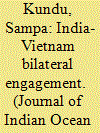

|
|
|
|
|
| Publication |
2014.
|
| Summary/Abstract |
Both India and Vietnam belong to a region that holds enormous potential, but also many challenges. We have a strong convergence of interests in working together, and with others in the region, for a stable, peaceful and prosperous Asia. ....Vietnam's emergence as one of the most vibrant economies in the Asia Pacific region is greatly welcomed by India, especially because we regard Vietnam as a trusted and privileged strategic partner and an important pillar of our Look East Policy".
|
|
|
|
|
|
|
|
|
|
|
|
|
|
|
|
| 8 |
ID:
133699
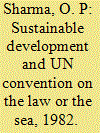

|
|
|
|
|
| Publication |
2014.
|
| Summary/Abstract |
United Nations Conference on Environment & Development (UNCED), Rio de Janeiro, 1992 In 1992, five years after the publication of the Brundtland Report, the United Nations Conference on Environment & Development (UNCED), known as the Earth Summit, took place in Rio de Janeiro, Brazil, between 3 and 14 June 1992. The Rio Summit brought together 182 world leaders - delegates from UN agencies and international organisations as well as world media and hundreds of Non- government organisations, to build upon the 1972 Stockholm conference and the 1987 Brundtland Report, and propelled sustainability on to the international stage. The Brundtland concept of sustainable development was universally endorsed at the 1992 United Nations Conference on Environment & Development (UNCED). The concept as elaborated by UNCED represents a new paradigm, a new mode of thinking to serve as a guide to action. Achieving sustainable development involves a process of decision- making in which certain questions are asked and appropriate choices and decisions made. Thus, there is never an end-state of sustainable development but a process that constantly tries to harmonise the needs of development with the maintenance of integrity of the Third United Nations Conference on the Law of the Sea for all the Sessions of the Conference between 1975 and 1982.
|
|
|
|
|
|
|
|
|
|
|
|
|
|
|
|
|
|
|
|
|